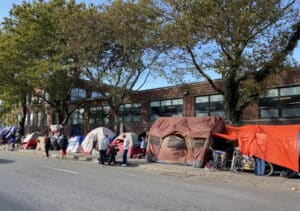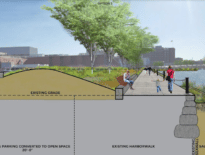
Clusters of tents form makeshift living space along Southampton Street in the "Mass. and Cass" area on Sunday, Sept. 26, 2021, directly across from the Boston Fire Department administrative headquarters. Photo by Sam Doran | State House News Service
Workers started removing the last tents Wednesday morning from a once-sprawling homeless encampment at a Boston intersection known as Mass & Cass.
City public works employees driving bulldozers loaded tents, tarps and other detritus, including milk crates, wooden pallets and coolers, into trash trucks to be hauled away, and street sweepers moved in once a section was cleared.
New Mayor Michelle Wu had pledged by Wednesday to get housing for people living in tents near the intersection of Massachusetts Avenue and Melnea Cass Boulevard.
Wu acknowledged that it may take more than a day to remove some of the remaining tents.
“Our goal from the beginning here was to take a different approach, one that was really grounded in the root causes of homelessness and the crises that people are living with here,” Wu, who took office in November, said at the scene.
Social workers helped people who had not yet left the camp, while police were also at the scene Wednesday. Wu and other city officials have said that they do not want to criminalize homelessness, and that officers were there to keep the peace.
Christopher Berrios, a 28-year-old homeless resident, said he lost his job due to COVID-19 and it was hard for him to find a place to stay given the high cost of housing.
“The rent out here in Boston – it’s expensive to get an apartment. Even to get a room, it was expensive,” he said. “Before I was living with my mom and stuff, but then she ended up moving to a one-bedroom apartment, so I couldn’t move with her, you know, because it was a one bedroom.”
The city has approached the encampment as a humanitarian and public health crisis because many of its residents were drawn by methadone clinics and social services in the area and were considered vulnerable to trafficking and other dangers.
A city survey in December found as many as 140 people living in the camp, where drug dealing and use often occurs in the open.
Local business leaders and real estate owners have said that, in addition to the humanitarian problems at the root of the encampment, the drug use and crime that have sprung up around it are forcing customers away and making many of their workers feel unsafe.
While COVID-19 transmission has been a fear at traditional, “congregant” homeless shelters, Massachusetts could soon make more beds available for homeless people who need a safe place to isolate while recovering from COVID-19, Health and Human Services Secretary Marylou Sudders suggested.
“We should have another isolation recovery hotel, west of Worcester – we lost of couple because of some local concern – this week, which will be like another 88, 100 beds to ensure that people are not on the streets and safe,” Sudders said while testifying before the legislature’s COVID-19 committee Tuesday.
Sudders was responding to comments from co-chair Sen. Jo Comerford.
The Massachusetts Coalition for Health Equity had called for the administration to provide emergency housing “for the unhoused, especially during the winter surge, and state-supported isolation beds for COVID-positive individuals” prior to the hearing.
“As the weather gets colder, and COVID-19 infection rates continue to spike because of the omicron variant, unhoused people in our state face a brutal choice: stay on the streets and risk dying of exposure, or try to get into dangerously overcrowded shelters and risk dying of COVID-19,” said coalition member and Disability Policy Consortium Executive Director Colin Killick.
State House News Service contributed to this report.





